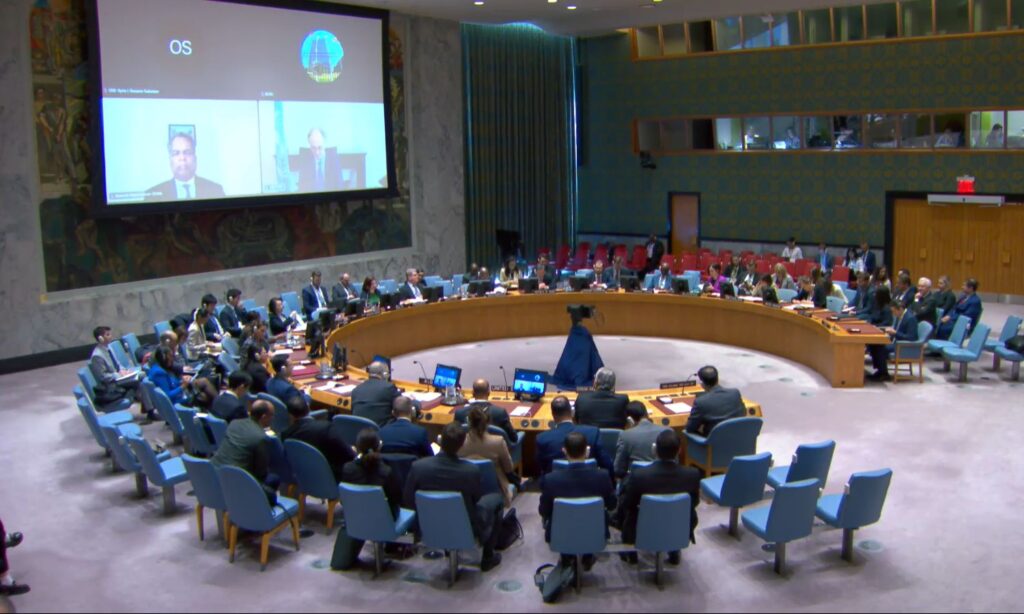The United Nations Special Envoy to Syria, Geir Pedersen, stated that the “gloomy specter of regional conflict” once again overshadows Syria, pointing out that under current circumstances, there are no indications of resuming the work of the Constitutional Committee due to issues unrelated to Syria.
During his speech at the Security Council on Thursday, April 25, Pedersen added that the situation in Syria motivates moving forward in creating a “safe, calm, and neutral environment” to start a political process aimed at facilitating the safe, dignified, and voluntary return of Syrians.
He noted that his best efforts, along with others, to address these situations through concrete measures from both sides “have not yet resulted in the required changes.” Instead, more Syrians wish to leave Syria and also the neighboring countries, risking their lives on perilous routes.
The Special Envoy for Syria considered that a combination of de-escalation, containment, and humanitarian aid, achieved through partial arrangements, contributes to improving the situation but is not sufficient to stabilize Syria, as it is not elsewhere in the region.
Pedersen stated that Syrians need to see a political pathway out of the “conflict,” consistent with resolution “2254”, and that “the renewal of the Constitutional Committee” might be part of this pathway. However, despite intensified efforts, there are no signs of resuming the committee meetings due to “issues unrelated to Syria”.
He added, “I am open to any alternative location to Geneva that gains consensus among Syrian parties and the host state, and my involvement continues in this matter. Meanwhile, I continue to call for resuming sessions in Geneva as a transitional option, and for the parties to prepare substantively, including on constitutional proposals.”
The absence of discussions about the ninth round of the Constitutional Committee followed a noticeable escalation and a wave of intensive meetings and statements since the end of last February, after Pedersen previously announced that he would send invitations for a ninth round at the end of April, expressing hope for a positive response from the Syrian parties.
He clarified at the time that the committee alone could not resolve the “conflict”, and that resolution “2254” addresses a broad range of issues, reminding everyone of the clear ideas regarding confidence-building measures on a “step-by-step” basis, and addressing the core elements of resolution “2254”.
Regional conflict casts a shadow over Syria
In his speech at the UN Security Council, Pedersen, along with the UN Secretary-General, condemned the strikes targeting an Iranian diplomatic building in Damascus at the beginning of the current month, widely attributed to Israel.
He also referred to the Secretary-General’s condemnation of the attacks Iran carried out against Israel on the 13th of the same month, while reports emerged of further attacks between the two sides, as well as others targeting US bases in northeastern Syria, attributed to Iraqi armed groups linked to Iran, according to Pedersen.
The Special Envoy for Syria expressed deep concern not only about the regional implications and risks arising from miscalculation and escalation but also about the “conflict” in Syria itself, which continues to mar the lives of the long-suffering Syrian people.
He added that any temptation to ignore or merely contain the “Syrian conflict” itself would be a mistake, noting that what is happening in Syria “is not a frozen conflict” and its effects can be felt not only in Syria.
Pedersen noted that there are no signs of calm in any area of Syria, considering that the violence is still escalating, and hostilities remain acutely ignited, any of which could spark a major new conflagration.
The UN special envoy expressed concern about this “dangerous and escalating” spiral of violence, noting that he has long warned that many treat Syria as a “free-for-all space to settle scores.”
In his speech at the UN Security Council, Pedersen stated that the humanitarian situation remains as “grim” as ever, emphasizing the need for access by all means, including cross-border and cross-line, for a humanitarian response.
He appealed to donors, both traditional and unconventional, to generously contribute to the humanitarian response, including early recovery programs, considering that international sanctions on the Syrian regime have impacted Syrians.
Since the beginning of April, Syria has witnessed a military escalation between Israel and Iran, with the former bombing the latter’s embassy in the Mezzeh district of the capital Damascus, resulting in the deaths of prominent officers from the Iranian Revolutionary Guard Corps. Iran retaliated by bombing Israeli territories with hundreds of drones and missiles, which did not reach their destination, while Tel Aviv resumed bombing inside Syria, and another in Iran.
The province of al-Hasakah also witnessed new targeting of a US base after a hiatus that lasted for more than two months of such targeting, following a widespread American assault on sites of Iranian militias behind this type of attacks.

